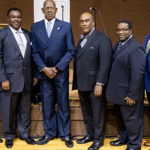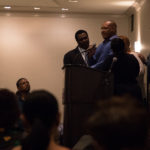The black church cherishes justice more than most other American Christians because its members read the Bible from the context of a historically oppressed people, two African-American Baptist pastors told a Texas Baptist workshop.
 Oscar Epps, pastor of Community Missionary Baptist Church in DeSoto, and Delvin Atchison, pastor of Antioch Baptist Church in Waco, said the “original sin” of racism in the United States has lasting effects on how African-Americans are viewed and how they view themselves.“We approach the Scripture in a way that is closer to the text, in the sense that we have a greater familiarity with the Hebrews’ experience. We understand what slavery is,” said Delvin Atchison, pastor of Antioch Baptist Church in Waco.
Oscar Epps, pastor of Community Missionary Baptist Church in DeSoto, and Delvin Atchison, pastor of Antioch Baptist Church in Waco, said the “original sin” of racism in the United States has lasting effects on how African-Americans are viewed and how they view themselves.“We approach the Scripture in a way that is closer to the text, in the sense that we have a greater familiarity with the Hebrews’ experience. We understand what slavery is,” said Delvin Atchison, pastor of Antioch Baptist Church in Waco.
He and Oscar Epps, pastor of Community Missionary Baptist Church in DeSoto, led a workshop titled “Let Justice Roll Down: African-American Perspectives on Justice,” held in conjunction with the Baptist General Convention of Texas annual meeting in Waco.
God working for those on periphery
“We see God as a God who works for those on the periphery,” Atchison said.
The dominant culture in the United States looks back with pride at the Declaration of Independence, a document that included the phrase “all men are created equal,” he noted. But most African-Americans only experienced independence when a president—whom they did not elect because they could not vote—proclaimed their emancipation.
“We could not declare our own independence. It came from an Emancipation Proclamation. Someone else had to say it for us,” Atchison said.
When it came to tabulating a state’s population to figure its representation in Congress, the founders of the United States included in the U.S. Constitution language that counted a slave as three-fifths of a person, he observed.
“The foundational document of this nation did not just say we are ‘other than.’ It said we are ‘less than,’” Atchison observed.
Sign up for our weekly edition and get all our headlines in your inbox on Thursdays
That original sin of racism in the United States has lasting effects on how African-Americans are viewed and how they view themselves, he noted.
A close-up look at unequal justice
Growing up in inner-city Dallas and serving 12 years as a Dallas police officer provided Epps a close-up look at unequal criminal justice in action.
“I watched white guys tapped on the wrist for things black guys would go to prison for,” he said.
Likewise, Epps noted, living and working in predominantly African-American areas gave him a clear view of social and economic injustice. While he acknowledged improvement in recent decades in terms of socio-economic and educational advancement, he said, “The changes still haven’t brought us up to level ground.”
Racial injustice continues primarily due to “ignorance and learned behavior,” Epps asserted.
Racist attitudes are learned, not innate, Atchison agreed. But once learned, they take effort to “unlearn,” he added.
“We’ve got to become comfortable talking about uncomfortable subjects,” he said.
Make effort to know one another
Anglo and African-American Christians need to make the effort to get to know each other and develop relationships, he added.
“The church has to make conscientious, intentional effort to be diverse,” Atchison said, suggesting Christians adopt cross-cultural and multiracial understanding as a spiritual discipline.
“We have to want to learn,” he said. “If we are going to spend eternity together in heaven, we need to learn what the whole Body of Christ is about.”














We seek to connect God’s story and God’s people around the world. To learn more about God’s story, click here.
Send comments and feedback to Eric Black, our editor. For comments to be published, please specify “letter to the editor.” Maximum length for publication is 300 words.